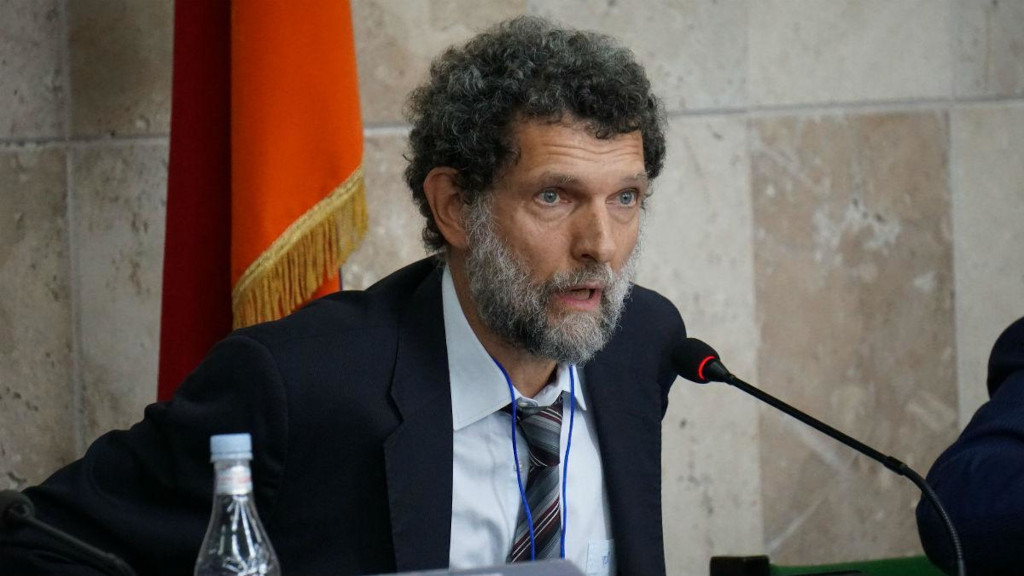Businessman and philanthropist Osman Kavala, who has been in prison since November 2017 on politically motivated charges, has demanded a retrial amid a recent controversy over his possible release from prison in the new political climate in the country following the March 31 local elections.
Kavala, 66, faced charges that have ranged from espionage and financing anti-government protests in 2013 to taking part in a failed coup against Turkish President Recep Tayyip Erdoğan in 2016.
He was arrested in 2017 and sentenced to life in prison in 2022 for allegedly trying to topple Erdoğan’s government with the Gezi Park protests, which erupted in the summer of 2013 in İstanbul against government plans to destroy a park in central İstanbul.
Kavala on Thursday demanded a retrial in a written statement released on his website through his lawyers.
“It is a requirement of fundamental principles of law and respect for human rights that cases involving blatant rights violations, convictions without evidence and years of imprisonment of innocent people be retried,” he said, underlining that justice is necessary for all.
The demand comes after Hilal Zengin, a member of Kavala’s legal team, on May 3 lodged a third petition requesting a retrial in his case to the İstanbul 13th High Criminal Court, arguing that Turkey’s shift to a presidential system has rendered previous charges against Kavala obsolete.
The lawyer said Kavala was sentenced to life in prison for allegedly attempting to overthrow the Turkish government but that a referendum in 2017 changed the country’s parliamentary system of governance to an executive presidency, abolishing the office of the prime minister and the cabinet serving under him, the supposed victims of the crime.
The developments follow debates over Kavala’s imprisonment after a rare face-to-face meeting between President Erdoğan and Özgür Özel, leader of the country’s main opposition Republican People’s Party (CHP), on May 2. In a press release after the meeting, Özel said he discussed Kavala’s situation with the president.
In the March 31 local elections, Özel’s CHP emerged as the leading party for the first time in 47 years, securing 37.7 percent of the vote, maintaining control of key cities and securing substantial gains in other regions, while Erdoğan’s Justice and Development Party (AKP), for the first time in 22 years, came in second, garnering only 35.4 percent of the vote. The CHP’s election success has given it more leverage in issues overlooked by the AKP.
Columnist Abdulkadir Selvi was the first pro-government figure to raise the possibility of Kavala’s retrial, which could eventually lead to his release.
“Everyone should understand this well. This is not about Osman Kavala, this is about Turkey. … What good would it be for Turkey to be sanctioned at the Council of Europe [CoE] because of Osman Kavala?” Selvi said in a column published in the Hürriyet daily on May 6.
A judgment in Kavala’s case in December 2019 by the European Court of Human Rights (ECtHR) found his detention to be arbitrary, politically motivated and in pursuance of an “ulterior motive,” that of silencing him as a human rights defender.
The non-implementation of the 2019 ruling prompted the CoE Committee of Ministers to launch an infringement procedure against Turkey in February 2022. Possible sanctions include European countries initiating investigations into people involved in Kavala’s imprisonment and Turkey losing its voting rights at PACE.
Selvi’s view was supported by Tuğrul Türkeş, the AKP’s Ankara MP and head of the Turkish delegation to PACE, while it was slammed by the AKP’s far-right ally, the Nationalist Movement Party (MHP).
In March the Committee of Ministers declared Turkey in “serious breach” of the European Convention on Human Rights and rule of law principles due to Kavala’s continued detention. The committee reiterated its deep concern and the need for Turkey to take all necessary steps to ensure the immediate release of Kavala and others detained under similar circumstances.
The committee plans to further examine these cases in their meetings in June and September 2024, continuing to push for judicial independence and respect for parliamentary immunity in Turkey.

